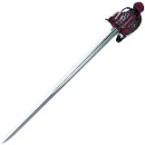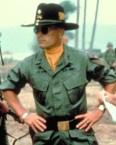Tbird3
Posts: 21
Joined: 3/19/2002
From: Oklahoma
Status: offline

|
quote:
ORIGINAL: Chelco
Hi Tbird3,
quote:
I hope this stirs up a bit of discussion or controversy.
You betcha!
I love a good debate......sorry about the late response. The audacity of people letting work get in the way of their wargaming! Okay my issue with Maneuver warfare is that people tout it as something new and something different. This can't be further from the truth. The concepts that are addressed in maneuver theory are merely strategic, operational, and tactical concepts that have been around for ages and trained and taught at about every military course since the romans. It is not some new method which was recently invented that has turned the US Military Machine into some kind of wonder force. Furthermore, I argue that there are times when attritional warfare is either more effective or more importantly the only method to use.
quote:
... Maneuver warfare is a generic phrase which I have a bit of heartburn. The concept of maneuver warfare as I have studied it is based on gaps and surfaces. The intent is that you want to bypass surfaces (enemy forces) and find the gaps (where the enemy ain't  ). Wow, what an original concept! ). Wow, what an original concept!
Gaps and surfaces is just one of the so-called "filters" of the theory maneuverists advocate. As any axiomatic phrase, considering it outside the theory will certainly lead you into a reductio ad absurdum.
quote:
This translates into what is called reconnassiance pull (maneuver warfare) versus attrition warfare (find the enemy and just grind him down). Personally I think this is mostly babble that cannot be clearly applied across the spectrum of warfare.
It is Recon-pull vs. Orders-pull, two different things.
Chelco, I stand corrected on this remark to a certain extent. You are correct about recon pull vs orders. However, what I was getting at by this remark is comparision of maneuver warfare vs attrition warfare. There has been some kind of historical backlash that tries to imply that the US Army just recently learned how to fight and win wars effectively. The typical assertion of manueverist is that the US Army historically only fought attritionally in the past and has just recently adopted this new theory of effectively waging war.
quote:
Additionally, for every "historical example" of justifiying this concept there is another one justifying attritional warfare.
Which historic example justifies attritional warfare? What happens when you are outnumbered? How do you attrit the enemy when you are outnumbered, outgunned and even worse, outmaneuvered?
General Grants Wilderness campaign is one of the first that come to mind. WWI might be another one...oops, we can do the indirect approach and hit Turkey maybe? Oh, thats right, they tried that.....I believe it was Galipoli? What do you do when outmaneuvered, outfought, outgunned? You die in glory or you surrender. When you go down this trail I have to ask several questions. What level of war are we talking about? Strategically? Operationally? Tactical? Because the answer is simple. It depends! When you go down this trail I have to ask several questions. What level of war are we talking about? Strategically? Operationally? Tactical? Because the answer is simple. It depends!
Lets look at it for a second. Desert Storm I, a great example of maneuver warfare! The "hail mary", "the left hook", and on and on. In reality it was generally a good application of the doctrine of airland battle. Airland battle was formally established in the US Army in 1982. If you look at what the MEF did in DS I you can in no way convince me that they were conducting maneuver warfare. The literally attacked into the teeth of the defense of Iraqi's. I believe that this attritional warfare at it's best, servicing enemy target arrays as necessary. However, from the 3rd Army's and CENTCOM's point of view they were conducting a penetration attack to initially fix the Iraqi army to facilitate VII and XVIII corps to conduct an envelopment of the Iraqi forces in and near Kuwait. Now, when you look at what VII corps did upon meeting the Iraqi Republican Guard Divisions you can't really call it manuever warfare either because it basically consisted of putting four armored divisions online and blasting their way through the enemy forces. So my arguement is that it just flatout depends on what your trying to accomplish is what will drive your course of action.
quote:
IMHO a military leader must have the flexibility to recognize situations where one or the other is applicable.
You talk like maneuver warfare or attrition warfare are options a commander has in the battlefield.
Absolutely! See above. A good commander is going to try to set the conditions for victory. It might be through manuever or might be through direct application of massive combat power at a selected location.
quote:
Remember die hard Manueverist love to use the WWII wehrmacht as the shining example of manuever warfare specialists and unless I am mistaken, they lost the war. 
Any country that takes the strategic decision to conquer the whole Europe and Russia is bound to defeat. Those strategic mistakes cannot be patched by tactical or operational wisdom.
Hey, the Germans eventually lost at the strategic, operational, and yest the tactical level. You have to win starting at the bottom up in order to achieve victory.
quote:
The other issue with these concepts is that at what level of warfare do they apply? I argue that there is no "silver bullet" when it comes to war.
Maneuver warfare applies to the tactical and operational level of war. There is no silver bullet in armed conflict. You will never find "recipes" on how to conduct an attack in any maneuverist treatise because the emphasis is on a set of mind you must have on how to defeat the enemy.
I believe this was my original arguement that you need to be flexible and not have a specific mindset. Additionally, maneuverist never quite completely tell you how to win but often than not how not win (read attrition).
quote:
Additionally, the general concepts that apply to war are ancient and in some ways unchanging. Do you ever wonder why military leaders continue to read the "art of war"? How can one argue with the concept of combined arms? Wow, if I combine and sychronize my archers and cav with my legions I can generate more combat power than with them separately. I think that is how Alexander, Julius Caeser, and other great tactical generals have won on the battlefield. Guess what? On the modern tactical battlefield you still want to do the same thing. The phrase we use is that we want to get every dog into the fight. I want to combine/ synchronzie my tanks, my infantry, my mortars, my artillery, my engineers and my air support so that the enemy will have deal with them simualtaneously.
Moltke, Lidell-Hart, Boyd or Lind didn't invent nothing new. They just gathered the elements and put them together.
Nobody argues that combined arms is a good thing. Pitty it doesn't work very well in present-day Iraq.
Who said that it isn't working in Iraq now? I tell you with the utmost confidence that it is being used very effectively. The conditions have merely changed and there is no "quick" solution to fight that is going on there now.
I love this. I hope they don't run us out of here!
Regards,
TBird3
|
 Printable Version
Printable Version
 ). Wow, what an original concept!
). Wow, what an original concept! 
 When you go down this trail I have to ask several questions. What level of war are we talking about? Strategically? Operationally? Tactical? Because the answer is simple. It depends!
When you go down this trail I have to ask several questions. What level of war are we talking about? Strategically? Operationally? Tactical? Because the answer is simple. It depends! 
















 New Messages
New Messages No New Messages
No New Messages Hot Topic w/ New Messages
Hot Topic w/ New Messages Hot Topic w/o New Messages
Hot Topic w/o New Messages Locked w/ New Messages
Locked w/ New Messages Locked w/o New Messages
Locked w/o New Messages Post New Thread
Post New Thread